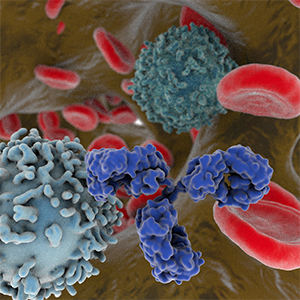 On August 14, 2023, the Food and Drug Administration (FDA) granted accelerated approval to elranatamab-bcmm (Elrexfio, Pfizer, Inc.) for adults with relapsed or refractory multiple myeloma (r/r MM) who have received at least four prior lines of therapy, including a proteasome inhibitor, an immunomodulatory agent, and an anti-CD38 monoclonal antibody. The biologics license application (BLA) for elranatamab was granted priority review, breakthrough designation and orphan drug designation by FDA.
On August 14, 2023, the Food and Drug Administration (FDA) granted accelerated approval to elranatamab-bcmm (Elrexfio, Pfizer, Inc.) for adults with relapsed or refractory multiple myeloma (r/r MM) who have received at least four prior lines of therapy, including a proteasome inhibitor, an immunomodulatory agent, and an anti-CD38 monoclonal antibody. The biologics license application (BLA) for elranatamab was granted priority review, breakthrough designation and orphan drug designation by FDA.
Elranatamab (PF-06863135) is a humanized IgG2a T cell-engaging bispecific antibody designed to target BCMA, which is highly expressed on tumor cells, and CD3 found on the T cell surface. Developed by Pfizer, elranatamab is formulated for subcutaneous, rather than intravenous, administration. The recommended elranatamab-bcmm dosages include the following: “step-up dose 1” of 12 mg on Day 1, “step-up dose 2” of 32 mg on Day 4, followed by the first treatment dose of 76 mg on Day 8, and then 76 mg weekly, thereafter, through week 24.
The prescribing information for elranatamab-bcmm includes a Boxed Warning for life threatening or fatal cytokine release syndrome and neurologic toxicity. Elrexfio is available only through a restricted program under a Risk Evaluation and Mitigation Strategy (REMS), called the ELREXFIO REMS.
Elranatamab’s efficacy was evaluated in MagnetisMM-3 (NCT04649359), a Phase 2, open-label, single-arm, multi-center study that included patients with r/r MM who are refractory to at least one proteasome inhibitor, one immunomodulatory drug, and one anti-CD38 antibody. Patients had measurable disease by International Myeloma Working Group (IMWG) criteria at enrollment. The main efficacy outcome measures were objective response rate (ORR) and duration of response (DOR), as assessed by a blinded independent central review based on IMWG criteria. The primary efficacy population consisted of 97 patients naïve to prior BCMA-directed therapy and who had previously received at least 4 prior lines of therapy, including a proteasome inhibitor, an immunomodulatory agent, and an anti-CD38 monoclonal antibody. The ORR in the 97 patients receiving the recommended dose was 57.7% (95% CI: 47.3%, 67.7%). With a median follow-up of 11.1 months among responders, the median DOR was not reached (95% CI: 12 months, not reached). The DOR rate at 6 months was 90.4% (95% CI: 78.4%, 95.9%) and at 9 months was 82.3% (95% CI: 67.1%, 90.9%).
FDA’s BLA review was conducted under Project Orbis, which provides a framework for concurrent submission and review of oncology drugs among international partners. The Australian Therapeutic Goods Administration, the Brazilian Health Regulatory Agency, Health Canada, and Swissmedic collaborated with FDA in the review process, and are continuing to review marketing applications for elranatamab.
Interested in data for other antibody therapeutics that have received marketing authorizations? Go to our searchable table of approved antibody therapeutics and those in regulatory review for more information.




